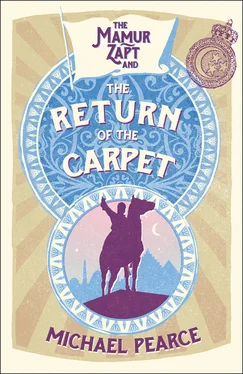Owen saw the first missiles and heard the warning shots.
Then, to the right, came the sound of a bugle and Owen looked up, with the crowd, to see a troop of mounted policemen advancing at the trot.
This was the pride of the Cairo Police: all ex-Egyptian Army cavalry men, all with long police service, experienced, tough and disciplined, mounted on best quality Syrian Arab stallions expertly trained for riot work.
They advanced in three rows, spaced out to give the men swinging room.
Each man had a long pick-axe handle tied to his right wrist by a leather thong.
At an order the handles were raised.
And then the troop was among the crowd. Handles rose and fell. The crowd opened up, and there were horses in the gaps, forcing them open still further. They split the crowd into fragments, and round each fragment the horses wheeled and circled, and the sticks rose and fell.
Whenever a group formed, the horses were on to them.
Students fell to the ground and either scrabbled away from the horses’ hooves or lay motionless. All over the Place were little crumpled heaps.
And now there were very few groups, just people fleeing singly, and no matter how fast they fled, the horses always outpaced them.
All this while, McPhee had stayed in the car, watching. Now he signalled with his hand, and out of the street behind him emerged a mass of policemen on foot.
They spread out into a long, single line and began to work systematically across the Place.
Anyone who was standing they clubbed. Behind them, in an area of the Place which steadily became larger, there was no one standing at all, just people sitting, dazed, holding their heads, or black gowns stretched out.
The last groups broke and fled, harried by the horses.
‘Very expertly done,’ said the Greek.
A student darted in among the stalls and tables close by them, a rider in hot pursuit. The student threw himself on the ground behind a stack of chairs. The horse halted and the policeman leaned over and hit the student once or twice with his stick. Then he rode away.
The student got to his feet, panting and sobbing. He looked back across the Place and saw the line of foot policemen approaching. In a second he had shot off again.
He reminded Owen of a hare on the run, the same heaving sides, panicked eyes, even, with his turban gone and his shaven head, the hare’s laid-back ears.
Another student rushed along behind the row of deserted street-stalls. He brushed right past Owen and then doubled back up an alleyway.
‘That one!’ snapped Owen. ‘Follow him! Find out where he goes!’
Georgiades, the Greek, who was one of Owen’s best agents, was gone in a flash.
The student was Nuri Pasha’s secretary and son, the difficult Ahmed.
The tea-seller put the urn back on his stall with a thump. Without asking, he drew a glass of tea and handed it to Owen.
‘Watching,’ he said, ‘is thirsty work.’
The only students on the square now were walking in ones and twos, sometimes supporting a third. Around the edges of the square, though, the foot police were still in action, prising out the students from their hiding-places among the stalls and chairs. Owen was pleased to see that McPhee had them well in hand. It was only too easy for them to get out of control in a situation such as this.
McPhee, helmetless and with his fair hair all over the place, was plainly enjoying himself. His face was lit up with excitement. It was not that he was a violent man; he just loved, as he would have put it, a bit of a scrap. Strange, thought Owen, for he was a civilian, an ex-teacher. On second thoughts perhaps it was not so strange.
He was using a cane, not a pick-handle. He had a revolver at his waist but had not drawn it throughout the whole business, even when he had been threatened in the car.
He was driving slowly round the square now, ostensibly chivvying the students, in fact, Owen noted, calling off his men.
At the far side of the Place the Mounted Troop had reformed and was sitting at ease, the horses still excited and breathing heavily, pick-handles now hanging loosely again from the riders’ wrists.
Georgiades reappeared.
He spotted the tea-seller and came up to the stall.
‘Here is a man who deserves to be favoured of Fortune,’ he said, ‘the first man back on the street with his tea.’
‘I shall undoubtedly be rich,’ said the tea-seller, ‘but not yet.’
He made Georgiades some mint tea. The Greek took the glass and stood casually by Owen.
‘See how our friend is already rewarded!’ he said to Owen. ‘Heads are the only thing damaged on the street today.’
‘And my head not among them,’ said the tea-seller.
He took the lid off the urn, looked inside and went to fetch some more water.
Конец ознакомительного фрагмента.
Текст предоставлен ООО «ЛитРес».
Прочитайте эту книгу целиком, купив полную легальную версию на ЛитРес.
Безопасно оплатить книгу можно банковской картой Visa, MasterCard, Maestro, со счета мобильного телефона, с платежного терминала, в салоне МТС или Связной, через PayPal, WebMoney, Яндекс.Деньги, QIWI Кошелек, бонусными картами или другим удобным Вам способом.












